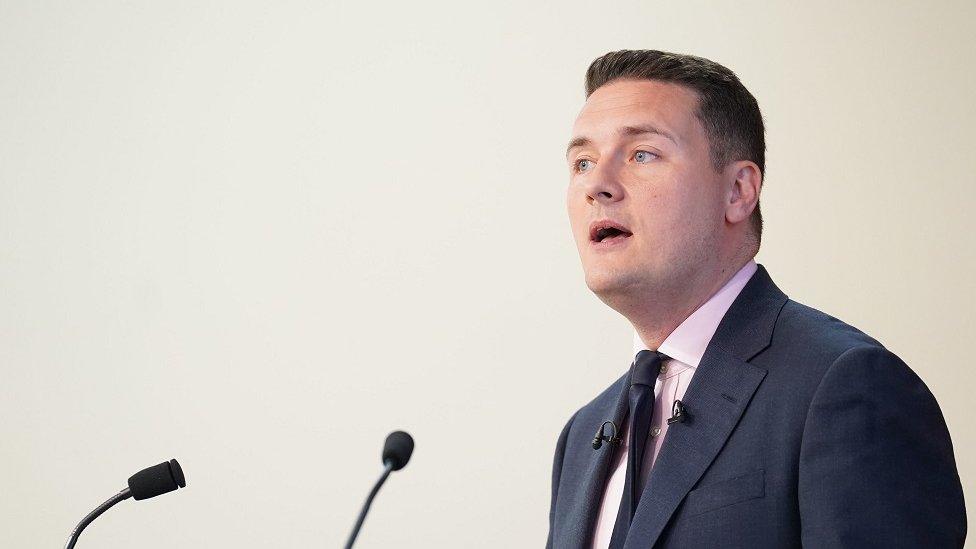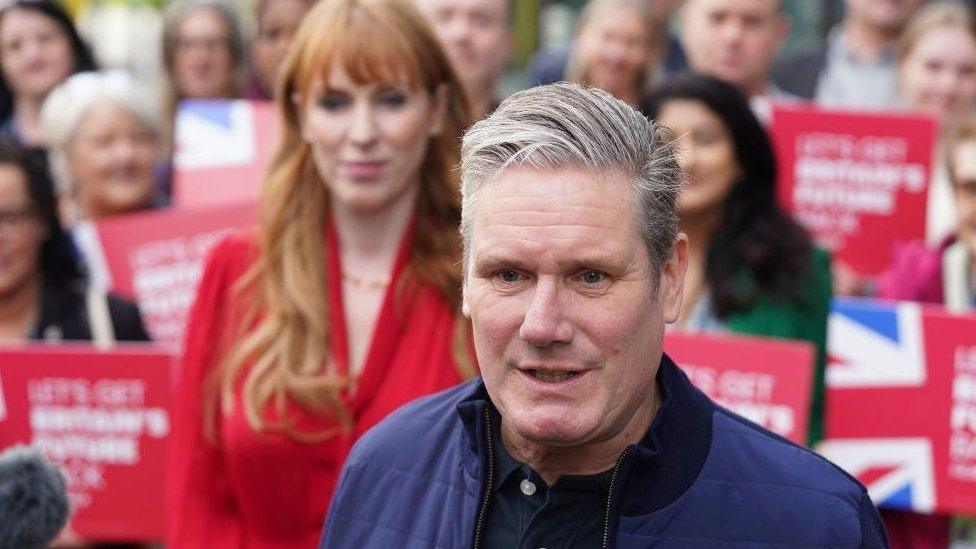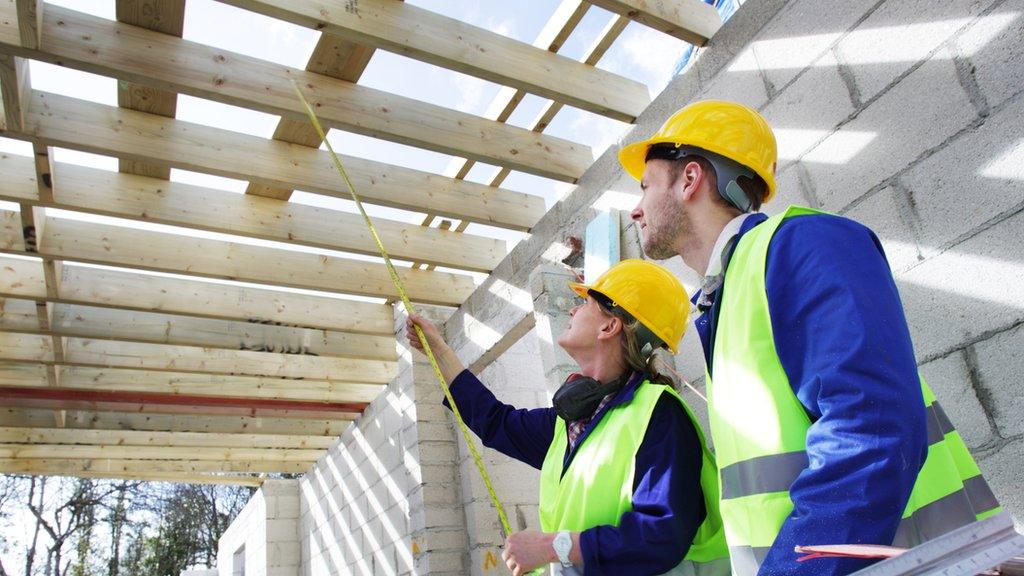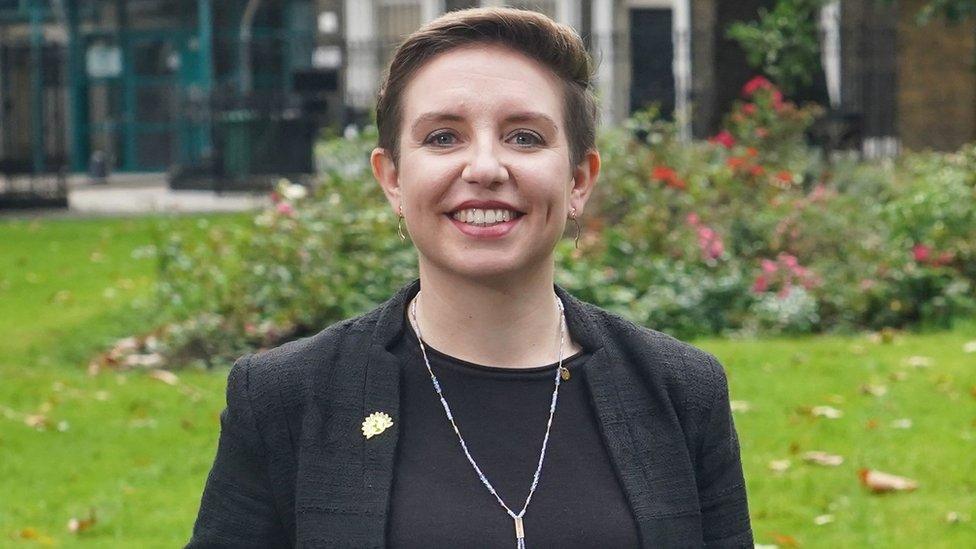Labour conference: Angela Rayner vows 'biggest' affordable housing boost
- Published
- comments
Watch: Angela Rayner pledges to build more affordable and social housing
Labour will create the biggest increase in affordable housing "in a generation" if it wins power, deputy leader Angela Rayner has promised.
Ms Rayner vowed to "get tough" with developers who tried to "wriggle out" of their social obligations.
The party would also free up funds for councils and housing associations to build more homes for rent, she said.
Ms Rayner was speaking as Labour gather for what could be their final conference before a general election.
She told conference-goers in Liverpool that Labour would reform the planning system to give local councils greater powers to "stand up to vested interests".
Ms Rayner, who is Labour's shadow housing secretary as well as its deputy leader, also said the party would "achieve rental reform" - including banning so-called no-fault evictions, something the government has repeatedly delayed.
She also promised to ban zero hours contracts and strengthen union powers in the first 100 days of a Labour government.
But she opened her speech by hailing Labour's resounding victory over the SNP in last week's Rutherglen and Hamilton West by-election as a "pivotal moment for our country" and a "watershed moment" for the party.
The result has raised hopes in the party of a Labour comeback in Scotland, potentially paving the way to victory at the general election, expected next year.
The Labour leadership will be hoping to use their week in Liverpool to draw dividing lines with the Conservatives on issues such as housing, net zero and climate.
But it is under pressure from some in their own ranks to be bolder in spelling out what the party stands for, after being cautious in recent months about announcing big spending commitments.
Housing target
Sharon Graham, general secretary of the Unite union, which has been the party's biggest funder at recent elections, told BBC News that Labour needed policies "people can go out and vote for".
If the leadership was too cautious - on issues such as nationalisation and economic reform - it could pay the price at the ballot box, she warned.

Wes Streeting is setting out plans to cut NHS waiting lists
She says Labour is focused on exceeding the unmet Tory pledge of 300,000 new homes a year, although she will not be putting a figure on that.
"If I get into government, if we're fortunate enough that the British people give us that opportunity, then my number one focus is to deliver on making sure we've got those houses for the future," she told BBC Radio 4's Today programme.
Asked what Labour's new housing target would be on the BBC's Sunday with Laura Kuenssberg show, Keir Starmer said it was 1.5m over five years, which equates to 300,000 a year.
Labour has pledged give local authorities greater powers to negotiate with property firms and build in the areas they need.
The party says it would prevent developers "wriggling out" of their affordable housing obligations, known as section 106 rules, by introducing an expert unit to give councils and housing associations advice on negotiating with property firms.
NHS waiting lists
It would publish guidance that would, in effect, limit companies to challenging these requirements only if there were genuine barriers to building homes.
Labour says it would also make it easier for councils to use cash from right-to-buy to build new homes.
And it would allow councils and housing associations to use a greater proportion of the grant funds they receive on buying housing stock, which they would then rent out as affordable homes.
Housing charity Shelter welcomed the proposals as a "good start", but said only a national programme "backed by serious investment" would tackle the housing crisis.
Meanwhile, Labour's shadow health secretary Wes Streeting has pledged to double the number of CT and MRI scanners in hospitals as part of a bid to cut NHS waiting times.
Labour would funnel £171m a year into a "fit for the future" fund for purchasing new equipment to help patients get diagnosed earlier, he said.
New equipment would have inbuilt artificial intelligence (AI) diagnostic tools, and would be funded by scrapping the non-dom tax status.
The British Medical Association welcomed the proposals, but urged Labour to also set out a plan to improve conditions for doctors to address the "key limiting factor" of staff shortages.
Related topics
- Published7 October 2023

- Published2 August 2024

- Published6 October 2023
